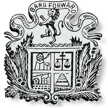Johnstone History Museum
Johnstone History Society • Scotland
World War II |
February 9, 2018 |
Johnstone's Military Encampments 1939 to 1940
Scots, French, English & Polish Troops all accommodated in Johnstone
February 9, 2018
When WW2 was declared on 3rd Sept. 1939 Johnstone became a temporary home to many military formations. The first soldiers to arrive in the town to take on home defence duties and training were the 1st Btn., Glasgow Highlanders (Highland Light Infantry) followed by its sister battalion, the 2nd Btn., Glasgow Highlanders (Highland Light Infantry).
The Town Hall and Church Halls were requisitioned to billet the troops in the town. The grounds of Johnstone Castle were used as a training area for the few Bren gun carriers which these units had. The Castle and its grounds were of course requisitioned for military use.
The first evidence of a military camp there was the arrival of French troops, the 49th Chasseurs Alpins, the men being in tents and the officers in the Castle. These French soldiers, wearing large blue berets, were known as Les Diables Bleu, or Blue Devils. As mountain troops proficient with skis, they were here as reserve troops for the Narvik operation in Norway. Before they could be sent, the operation was over with what was left of the force withdrawn. They were returned to France in May 1940 where they met the onslaught of the German Panzers at the Somme, the remnants being forced to surrender at Caulieres, others joining the retreat of the 51st Highland Div. to St Valery where they surrendered.
The next troops to arrive were the Sherwood Foresters who had returned from Norway. Here a short time, they left for Northern Ireland.
Next came the Polish soldiers. The 24th Polish Lancers, the 10th Polish Mounted Rifles, based at a tented camp (bell tents) at Johnstone Castle were involved in home defence, together with a Polish Engineer Unit based at the Town Hall, building defences at Abbotsinch aerodrome and Hillington Industrial Estate. They later moved to the East Coast being part of General Maczeks Polish Armoured Division seeing action at Falaise in 1944. Sadly one of their number shot himself at Johnstone Castle. He was Officer Cadet Bogdan Szczurek, age 22 of the 10th Polish Mounted Rifles, who died on 7th October 1940, and is buried in Hawkhead Cemetery, Paisley.
The Town Hall and Church Halls were requisitioned to billet the troops in the town. The grounds of Johnstone Castle were used as a training area for the few Bren gun carriers which these units had. The Castle and its grounds were of course requisitioned for military use.
The first evidence of a military camp there was the arrival of French troops, the 49th Chasseurs Alpins, the men being in tents and the officers in the Castle. These French soldiers, wearing large blue berets, were known as Les Diables Bleu, or Blue Devils. As mountain troops proficient with skis, they were here as reserve troops for the Narvik operation in Norway. Before they could be sent, the operation was over with what was left of the force withdrawn. They were returned to France in May 1940 where they met the onslaught of the German Panzers at the Somme, the remnants being forced to surrender at Caulieres, others joining the retreat of the 51st Highland Div. to St Valery where they surrendered.
The next troops to arrive were the Sherwood Foresters who had returned from Norway. Here a short time, they left for Northern Ireland.
Next came the Polish soldiers. The 24th Polish Lancers, the 10th Polish Mounted Rifles, based at a tented camp (bell tents) at Johnstone Castle were involved in home defence, together with a Polish Engineer Unit based at the Town Hall, building defences at Abbotsinch aerodrome and Hillington Industrial Estate. They later moved to the East Coast being part of General Maczeks Polish Armoured Division seeing action at Falaise in 1944. Sadly one of their number shot himself at Johnstone Castle. He was Officer Cadet Bogdan Szczurek, age 22 of the 10th Polish Mounted Rifles, who died on 7th October 1940, and is buried in Hawkhead Cemetery, Paisley.
